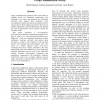Free Online Productivity Tools
i2Speak
i2Symbol
i2OCR
iTex2Img
iWeb2Print
iWeb2Shot
i2Type
iPdf2Split
iPdf2Merge
i2Bopomofo
i2Arabic
i2Style
i2Image
i2PDF
iLatex2Rtf
Sci2ools
SASO
2007
IEEE
2007
IEEE
In Search of Simplicity: A Self-Organizing Group Communication Overlay
Group communication primitives have broad utility as building blocks for distributed applications. The challenge is to create and maintain the distributed structures that support these primitives while accounting for volatile end-nodes and variable network characteristics. Most solutions proposed to date rely on complex algorithms or global information, thus limiting the scale of deployments and acceptance outside the academic realm. This article introduces a low-complexity, self-organizing solution for maintaining multicast trees, that we refer to as UMM (Unstructured Multi-source Multicast). UMM uses traditional distributed systems techniques: layering, soft-state, and passive data collection to adapt to the dynamics of the physical network and maintain data dissemination trees. The result is a simple, adaptive system with lower overheads than more complex alternatives. We have implemented UMM and evaluated it on up to 1024-node emulated ModelNet networks and on the PlanetLab testbe...
Group Communication Primitives | SASO 2007 | Self-Organizing Systems | UMM’s Low Overhead | Unstructured Multi-source Multicast |
| Added | 04 Jun 2010 |
| Updated | 04 Jun 2010 |
| Type | Conference |
| Year | 2007 |
| Where | SASO |
| Authors | Matei Ripeanu, Adriana Iamnitchi, Ian T. Foster, Anne Rogers |
Comments (0)

